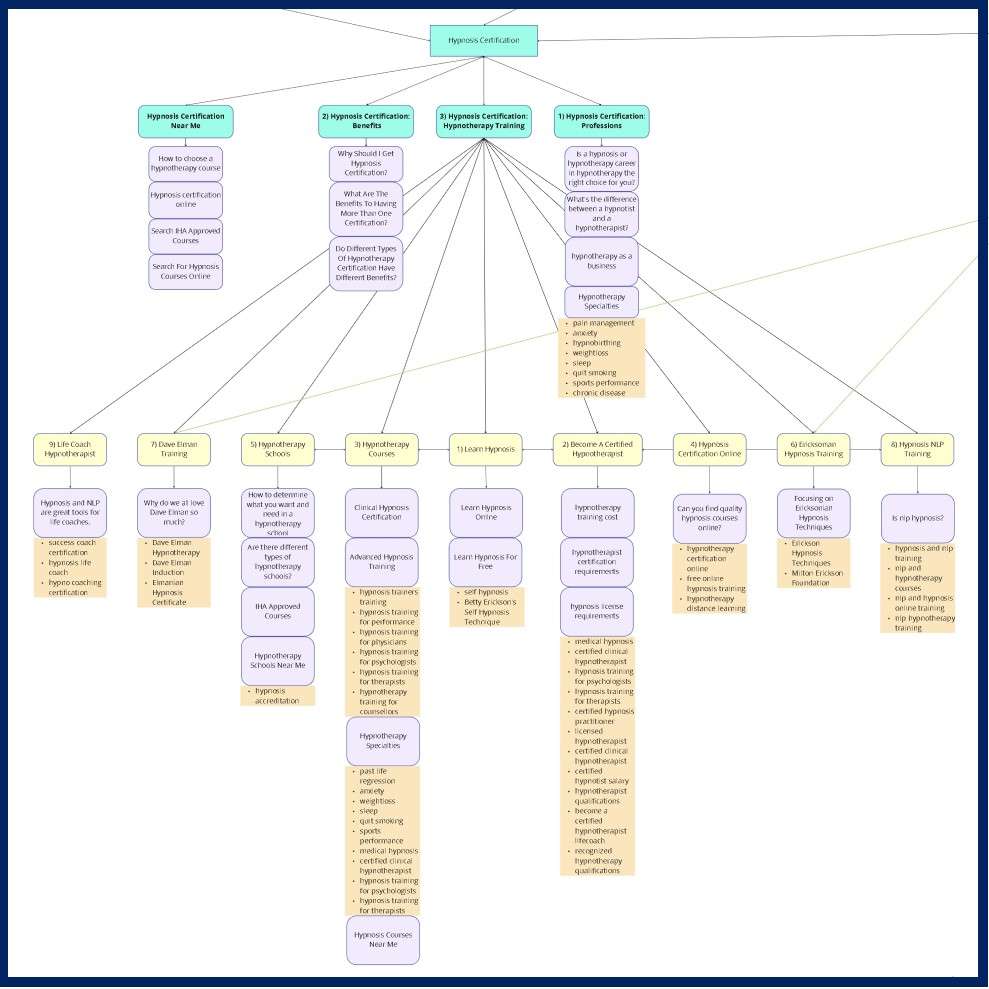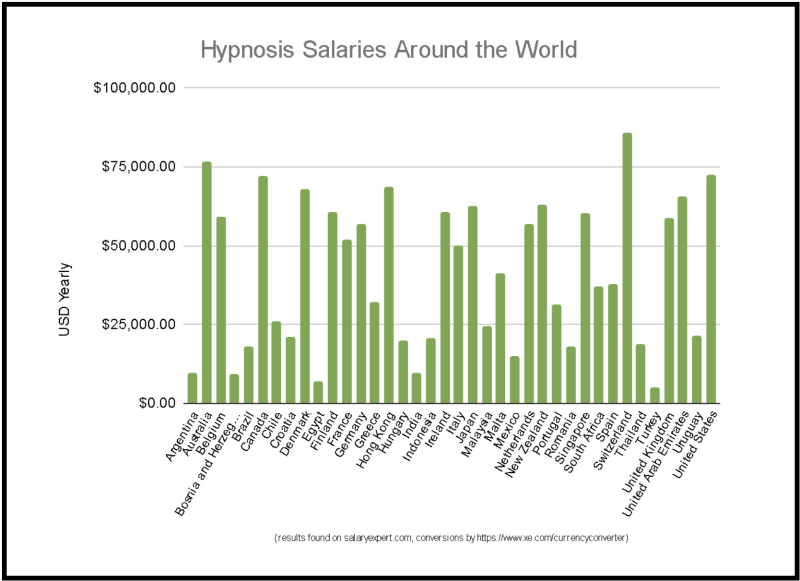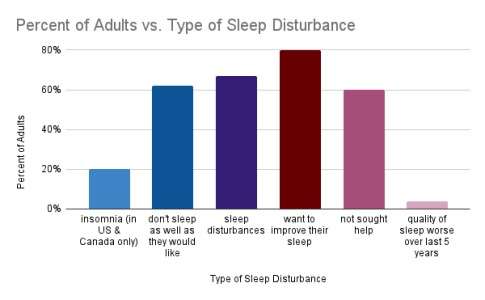Hypnotherapy Certification Guide: Everything You Need To Know
Learn What You Need To Know To Get Hypnosis Certification
This hypnotherapy certification guide is intended to help you at any stage of the certification process. From training to certification, getting certified as a hypnotherapist or hypnotist is fairly straightforward.
1) Take a hypnotherapy course that gives you a proper foundation and course certificate.
2) Get certified by an independent 3rd party hypnosis association, like the International Hypnosis Association, or the National Guild of Hypnotists - or both.
Getting certified by one of the professional organizations mentioned above is an important step. Your future clients want to know that you have satisfied criteria set forth by your peers, and by someone other than the person who taught the course that you took.
Are you ready to get your IHA Hypnotherapy Certification now???
Start your hypnosis training
right away.
If you already have training, you can apply for IHA Certification in less than 1 minute!
Your Hypnotherapy Certification Questions Answered
If you search the internet for terms like hypnosis or hypnotherapy training, you'll get a lot of results. So if you are trying to make a decision that will lead to qualifying for hypnotherapy certification...what do you need to know? There are a wide variety of hypnosis courses, and not all of them are going to give you a really good foundation so that you can become a Certified Hypnotherapist (or Certified Hypnotist).

If you are at the very beginning of your journey, then you're in luck, because you have the time to figure out if a course is worth what they are asking you to pay? But how do you know what you need to know to make an informed decision?
Don't worry. For the first step on your journey, you don't need to know everything all at once.
Eventually you’ll need to know everything from what type of hypnotist you want to be, to how to learn hypnosis and find a good hypnotherapy course. But it's ok to take it one step at a time - that's what this Hypnosis Certification Guide is for.
You can skip to any of the following topics from here:
If you're new to the subject, let's start at the beginning. Watch this video, and let's talk about what hypnosis is, and what it's good for:
we made this Hypnotherapy Certification Guide to answer as many of your questions as We Can
This guide is meant to address everything about hypnosis certification. At least, everything we can think of to help you on your journey, whether you are a hypnosis novice, or a professional hypnotherapist.
Hypnosis Certification Guide Map

How to Use Our Hypnotherapy Certification Guide
If you really want to know EVERYTHING about hypnosis certification, read this page, follow the links, really explore hypnosis from top to bottom. If you click all the links, watch the videos, and visit some of the relevant links to outside sources, you'll get a very thorough understanding of the topic of hypnosis and hypnotherapy certification.
Of course this page is a guide. You won't learn hypnosis from reading what we offer here, but you will learn HOW to learn and get certified in hypnosis.
And finally, but VERY importantly:
Disclaimer Alert! We endorse ONLY IHA Approved Courses and International Hypnosis Association Members. We want to give you plenty of useful and unbiased information, so the informational sections and pages on this website may include links to other organizations and courses that are not “IHA Approved”. We do NOT specifically endorse any organizations, courses or certification programs mentioned here unless they are on our “IHA Approved Courses” list.
Hypnosis Certification: Professions
Is A Hypnosis Or Hypnotherapy Career The Right Choice For You?
Maggie’s Journey To A Career As A Certified Hypnotherapist
"When I was in college, many MANY years ago, all I knew about hypnosis was what I had seen in the movies. In other words, not much.
Like most people, I didn’t really think about it at all, and if it showed up in my world, it was at a county fair. If I’m being completely honest, I didn’t believe in any of the stage hypnosis that I had seen - I figured everyone was faking it.
So how did I end up having a career spanning over 25 years in the world of hypnosis & NLP?"

Maggie learned that hypnotherapy met ALL of her career goals. She wanted to help people, she was deeply curious about the human mind, and something of a detective when it came to learning what makes people “tick”. She wanted to make good money helping people resolve their issues and reach their goals.
Being a Certified Hypnotherapist was a perfect choice for Maggie, and it could be a great choice for you, too.
So, what are YOUR career goals?

Basic Questions To Ask Yourself When Considering ANY Career In Hypnosis
- What are you looking for? Money? Fulfillment? Excitement?
- Do you like working with people? Or would you rather be on a computer, or out in the wild working with animals? Because let’s face it - you kind of need to have people to hypnotize, if you’re going to be a hypnotist.
- Do you want to use hypnosis to entertain people, or are you more interested in using hypnosis in a therapeutic setting to help people?
There are no right or wrong answers to these questions. Like any path to discovery, learning about hypnosis and hypnotherapy careers starts with knowing what you want. So before you get certified as a hypnotherapist, take the time to really figure out your goals.
What's The Difference Between A Hypnotist And A Hypnotherapist?

The difference between a hypnotist and a hypnotherapist is primarily semantic, and can be more indicative of the governmental regulations of a region, than on the type of hypnosis someone practices.
A stage hypnotist is not practicing hypnotherapy on stage, of course. So sometimes the difference in terminology can depend on the application of hypnosis.
However, in many places, the terms are both used to refer to someone who practices hypnotherapy, particularly if they are a Certified Hypnotist or a Certified Hypnotherapist.
Just a quick reminder - if you already know this stuff, and just need to know how to get certified as a hypnotist or hypnotherapist, you can skip ahead to Become A Certified Hypnotherapist.
Regarding hypnotherapy specifically, a hypnotherapist is someone who uses hypnosis in a therapeutic setting. A Certified Hypnotherapist is someone who has met criteria that means they have received training in how to use hypnosis as a tool to help people. Often counselors will want to add hypnotherapy to the services they offer. If they already have a legally recognized license in the mental health field, they will almost definitely be able to call themselves a Certified Hypnotherapist upon completion of their hypnotherapy education.
They also need to have met whatever stipulations their regional government has regarding the use of hypnosis as a therapeutic tool.
On the other hand, a Certified Hypnotist or Consulting Hypnotist may have a bit broader application of hypnosis. Depending on regulations in a given region, a Certified Hypnotherapist may need credentials beyond hypnotherapy education in order to practice hypnosis for therapeutic purposes, where as a Certified Hypnotist or Consulting Hypnotist may have taken the same hypnotherapy courses, but differ in their other credentials (i.e. may not have an education in mental health counseling or psychology).
The type of hypnosis a Certified Hypnotherapist practices can vary, as well. For instance, if you take a course in Ericksonian Hypnotherapy, you will still need to ensure your certification meets your local regulations.
Stage hypnotists may not bother getting certified at all, because they are just using hypnosis for entertainment purposes. Maybe they use it to have fun with their friends at parties, or maybe they are a world famous stage performer or do online videos about street hypnosis.
To be clear, a hypnotist who has gotten certified can use the designation "Certified Hypnotist" and practice hypnosis for therapeutic purposes only if the regulations and laws in their region allow it. It mainly depends on what they choose to call themselves, and the regulations in their part of the world.
A Quick Note About Hypnotherapy Certification
Hypnotherapy certification is especially important, but you have to be careful. You want to be able to trust that the certification is a legitimate measure of the knowledge and skill base necessary to safely and effectively use hypnosis to help people.
Make sure you read more about what hypnotherapy certification actually IS and means, because the field of hypnotherapy has variable regulation around the world. We'll have more about that later.
What Can I Earn as a Certified Hypnotherapist?
The simple answer is that a skilled hypnotherapist with a sense of the business of hypnotherapy can make a very good living in most countries.

Salaries for hypnotherapists around the world can vary widely, however. The chart above shows a sampling of average salaries around the world, converted to USD for comparison. Please refer to the table below for hypnotherapist salaries in the applicable currency (this table is from 2023).
Country
| |||||||||||||||||||||||||||||||||||||||||||||||||||||||||||||||||||||||||||||||||||||||||||||||||||||||||||||||||||||||||||||||||||||||||||||||||||||||||||||||||
|---|---|---|---|---|---|---|---|---|---|---|---|---|---|---|---|---|---|---|---|---|---|---|---|---|---|---|---|---|---|---|---|---|---|---|---|---|---|---|---|---|---|---|---|---|---|---|---|---|---|---|---|---|---|---|---|---|---|---|---|---|---|---|---|---|---|---|---|---|---|---|---|---|---|---|---|---|---|---|---|---|---|---|---|---|---|---|---|---|---|---|---|---|---|---|---|---|---|---|---|---|---|---|---|---|---|---|---|---|---|---|---|---|---|---|---|---|---|---|---|---|---|---|---|---|---|---|---|---|---|---|---|---|---|---|---|---|---|---|---|---|---|---|---|---|---|---|---|---|---|---|---|---|---|---|---|---|---|---|---|---|---|
Hypnotherapy Specialties
When considering a career in hypnotherapy, you may want to investigate hypnotherapy specialties. Here is a list of just some of the areas in which hypnotherapists can choose to specialize, and you can find certification courses for many of these specialties.

Hypnosis for Pain Management
- Using hypnosis to help manage pain has been an accepted and highly effective therapy for decades - possibly a whole lot longer than that. Working with chronic pain, in particular, has a very high success rate.
- It’s important to understand how to work with increasing comfort and decreasing discomfort, as well as how to separate the physical sensations from the emotional reactions. You can get a specialty certification for hypnotherapy for pain management.
- Special note: Whenever you are working with someone with any kind of medically indicated condition, you should get a referral from a medical professional (if you are not one yourself).
Relevant Links:

Hypnosis For Anxiety
The very nature of hypnosis lends itself to helping people manage anxiety and stress. From offering something as simple as some instruction in self hypnosis, to helping a client find and resolve the root of their anxiety, specializing in hypnosis for anxiety can be a highly successful path to a fulfilling career. There are specialty certifications available for hypnosis for anxiety, in fact, the Hypnosis Motivation Institute breaks it down even further in their hypnosis certification course available on Zoom for Test Anxiety specifically! You can find it at Certified Specialist in Test Anxiety and Success.
Relevant Links:

Hypnosis for Weight Loss
Hypnosis for weight loss is a classic, “bread and butter” type of hypnotherapy. It is one of the most common hypnosis specialties, and one of the most common reason people seek help with hypnosis.
When practicing hypnosis for weight loss, it is important to understand the client’s goals. There are often many emotional and physical elements that contribute to their current weight.
It would be a mistake to simply suggest a client start liking broccoli and disliking cake, because weight loss is much more complex than that.
It will also be important to make sure your weight loss clients are seeing a doctor or other qualified health care provider, prior to working on a new healthy life with you.
Many hypnotherapists offer hypnosis for weight loss, so there are plenty of hypnotherapy for weight loss certification programs to go around.
Relevant Links:

Hypnosis for Sleep
If a client is highly suggestible, hypnosis for sleep can be a very simple, one session process. However, it is often not as simple as taking someone into a trance, making the suggestion that “sleep will come quickly and easily to you”, and calling it done.
You wouldn’t want them to start falling asleep in the middle of a meeting, would you?
So like all hypnosis suggestions, context is important.
Difficulty sleeping can be complicated to resolve, depending on the causes of the sleep disturbance.
***Again, make sure your client has seen a medical professional to manage any sleep related health concerns.***
According to the NIH, there is a “Global Problem of Insufficient Sleep” that has “serious public health implications”.
SingleCare.com published an article on 2022 Sleep Statistics, which states the following:


Hypnosis to Quit Smoking
Ah - hypnosis to quit smoking, or stop smoking, or hypnosis for smoking cessation.
Include all of those terms in a Google search and you will find literally millions of results. So it is no surprise that specializing in hypnosis to quit smoking, and getting a specialty certification in “Stop Smoking Hypnosis”, is a popular and easily accomplished goal.
But be careful to find a certification course you feel good about.
There are some important things to consider when thinking about whether you want to get a specialty hypnosis certification to help people quit smoking.
- Have you ever smoked? Whether you have or have not, how might this affect your approach with clients?
- Do you have a belief system or bias that could prevent you from having an open and compassionate approach to smoking cessation or any other addiction?
- Do you understand the foundational elements of addiction inherent in smoking?
- Does the smoking cessation course you are considering address these issues, or do they just teach a basic “stop smoking hypnosis script”?
Relevant Links:

Hypnosis for giving birth, or “Hypnobirthing®”
Women all over the world have always had many alternative methods to help make giving birth a more joyous and less uncomfortable experience. Hypnotic techniques are often employed by birthing classes - such as breathing in a certain rhythm, focusing on pleasant images, relaxation techniques, etc.
From the village midwife to modern day doula's, some form of focus and breath work is almost always taught to expecting mothers.
So it's not a far leap to see more and more parents choosing to apply hypnosis during the birthing process.
Specializing in hypnosis for pregnancy and birth offers a joyful and fulfilling career course.
In fact, there is one particular certification course to “rule them all”, and that is Hypnobirthing®. There are other courses out there, but Hypnobirthing has been around for decades. In fact, the creator of Hypnobirthing, Marie Mongan, literally wrote the book on it in 1989 - HypnoBirthing™– A Celebration Of Life.
Relevant Links:

Hypnosis for Sports Performance
Many athletes and coaches recognize the power of the mind in enhancing sports performance.
If you have the confidence and prowess, a career as a sports hypnotist can be a lucrative and satisfying endeavor.
As with most hypnosis specialties, there are certification courses available for sports hypnosis.
Relevant links:

Hypnosis for Chronic Disease Management
Anyone who lives with a chronic disease can tell you that managing the symptoms, including the impact on mental and emotional health, is very different from working with short term or acute pain or illness. Hypnosis can be a highly therapeutic tool in dealing with the daily challenges inherent in chronic disease.
However, and this is a BIG however: When working with clients for chronic disease management, ALWAYS get a medical referral if you are not a licensed health care provider yourself.
Certification in using hypnosis for chronic disease management is available, although it is usually recommended that the hypnotherapist have a strong background in healthcare. It is always important to get a referral from a licensed healthcare professional before working with anyone working on health related issues.
Relevant Links:
Hypnotherapy Certification: Benefits

What Are The Benefits Of Getting Certified In Hypnotherapy?
Certification lets your future clients know that you have successfully completed a course or courses that give you the knowledge and skill to use hypnosis in a therapeutic environment. And even more importantly, have demonstrated your competency in those skills.
Although most courses give course completion certificates, your future clients may feel more comfortable if you make the effort to get certified by an independent, 3rd party. An organization that ensures that your course did indeed have the necessary elements to meet or surpass industry standards.
Of course there are differences in types and levels of hypnosis certification.
For instance, anyone can get a "course completion" certificate for watching a 2 hour free hypnosis video. That might feel nice, but it is not going to mean you are now a certified hypnotherapist. It certainly WON'T prepare you to work with clients in an effective and safe way.
Getting a certificate for completing a hypnosis course is important and valid. However, getting additional certification from a respected and recognized entity, and/or from an independent, objective third party organization, will ensure that your certification stands up to scrutiny.
Getting a certification in addition to your course completion certificate requires that the hypnosis course you have taken meets a broader, agreed upon set of standards. In a world where hypnotherapy standards vary wildly, and regulation is irregular (and sometimes non existent), acquiring a second, independent certification attesting to the legitimacy of your education and skill set really does matter.
For both you, and your clients.
Hypnosis Organizations Offer Additional Benefits With Membership & Certification

Different hypnosis associations offer different benefits.
Some organizations have been around for a long time, and offer everything from certification, to journals and magazines, to full certification courses.
Other organizations may offer certification with the primary goal of selling their own courses.
Some organizations are strictly membership and certification bodies, existing independent of the "upsell" culture.
The IHA, and other organizations like it, are there strictly to ensure that certain standards of excellence can be applied to our industry. We offer membership and certification with membership benefits geared toward helping our members thrive in their chosen careers.
Membership benefits can range from a profile listing on websites, additional free education, professional networking, and more.
So when considering the benefits of certification, include researching the benefits of joining the various organizations.
Relevant Links:
Hypnotherapy Training

Learn Hypnosis
Some people have a fascination with hypnosis from when they were very young.
That was true for Keith, the Director of Education at the IHA. Others don’t really think about it at all until an event or person brings it into their awareness.
The same can be said of NLP.
Like many people, I (Maggie) had never even heard of NLP until college. On the other hand, my kidlet grew up in a household with a parent who was an NLP Master Practitioner & Trainer. So NLP is just part of how she approaches the world as an adult.
Regardless of how you became aware of it, if you want to learn hypnosis the first thing you need to ask yourself is "Why?"
Having A Map For The Journey
Once you know your purpose, you have a better sense of the direction you would like to take.
That's when you can start narrowing down the options for learning hypnosis.
At a very introductory and basic level, you can learn hypnosis for free online. A simple Google search for “Learn hypnosis online for free” returns over 7 million results. So there is a lot to choose from.
Do exercise some caution if you choose a free hypnosis course, especially if you want it to be a foundation for a hypnosis certification track when you get further along on your journey. Be wary of claims that seem too good to be true.
Think about the gravity of becoming a Certified Hypnotherapist, and have the mental and emotional well being of your clients in mind - you are going to WANT to know what you are doing.
Learning Self Hypnosis
It is a really good idea to learn self hypnosis and be able to teach it to your clients. Even if you're just learning self hypnosis for your own personal growth, we highly recommend it.
Much like meditation, self hypnosis has been shown to have a myriad of health benefits, from reducing and managing stress, to using a more effective form of visualization for personal and professional development.
We have a page on learning self hypnosis so that you can get started right away.
Become A Certified Hypnotherapist

Make a Plan to become a Certified Hypnotherapist
The process you go through before you become a certified hypnotherapist requires careful thought, and your due diligence in researching options.
From what you want to do and whether you want to specialize...
...to what you'll charge for your services and HOW you want to learn and work, you'll need to make some decisions.
We recommend making a plan, and then being prepared to be flexible within that plan. In fact, we've created a page to help you develop your plan:
hypnotherapist certification requirements
As you will find doing any research on the subject, hypnotherapy certification requirements vary wildly.
If you want to practice hypnotherapy confidently, and assure your clients that working with you is safe and effective, then it is up to you to ensure you have the necessary education and credentials.
Hypnotherapy Certification Courses
7 Core Elements of a Hypnosis Education
As has been pointed out multiple times on this page, hypnosis certification requirements vary. So you will want to have an idea of what to look for when determining your certification path. The following list is a basic, bare minimum of what you will need to know to be a hypnotherapist.
The hypnosis education you receive should cover all of the necessary elements, including (but not limited to):
- An explanation of what hypnosis is, including a discussion of the subconscious & conscious mind.
- Hypnosis terminology, i.e. suggestion, trance, deepening, catalepsy, subconscious, etc.
- The structure of a hypnotic session.
- Information gathering.
- Hypnotic inductions.
- Hypnotic suggestion.
- Emerging from trance.
For more information about hypnosis certification courses, you can go in depth by clicking on the "More About Hypnotherapy Courses" button. Or, you can click on the "IHA Approved Courses" button to go directly to a list of courses that have met our accreditation criteria.
Hypnosis License Requirements
A hypnotherapy certification is NOT the same thing as a legal license to practice hypnotherapy - no matter what you might read elsewhere.
A license to practice indicates that you have met all of the legal requirements in your region, which usually includes certification. You will need to check with your local government and apply, if a license is necessary. Licenses allow the applicable governing body to regulate hypnotherapy requirements.
Note: Hypnotherapy and hypnosis are not regulated in many parts of the world.
On a global level, regulations regarding whether a hypnotherapist needs a license to practice hypnotherapy varies. It even varies within the United States. While there are no nationwide regulations in the United States that pertain to hypnotherapy specifically, different states have different legal requirements when it comes to the practice of hypnosis for a therapeutic purpose. A very small number of states require licensure/registration.
It is important for every certified hypnosis practitioner to adhere to the relevant laws in their region.
Do not call yourself a licensed hypnotherapist just because you are certified.
In short, ensure that what you say about yourself in any marketing or to your clients is 100% true. Be careful to avoid anything misleading. In many regions, using the term "Certified Hypnotist" or "Certified HypnoCoach" may be a more appropriate designation, as long as you are clear about your use of hypnosis in those contexts.
Disclaimer Alert!
We are NOT offering any legal advice about licensing and regulation of hypnosis in your region.
This page claims no absolute legal information regarding hypnosis & hypnotherapy licensing and regulation anywhere. Please check with your local authorities to find out what licensing requirements and regulations apply to you.
If you are already a licensed mental health counselor, psychologist, or medical professional, adding hypnosis to your toolbox can be useful and the laws that apply to your existing licensure should be reviewed to ensure you are abiding by anything relevant to the practice of hypnosis.
Hypnosis, NLP and Life Coaching
Hypnosis and NLP are great tools for a life coach - sometimes referred to as a "HypnoCoach. A life coach that can use hypnosis and NLP to help their clients overcome obstacles and achieve their goals is exponentially more effective than one that is limited to more limited coaching tools.
Many hypnosis and NLP certification programs offer life coach or hypnocoaching certification.
More to know:
We will be adding more information and additional pages relevant to hypnosis certification over the next few months. Feel free to check back, or contact us for more information.

